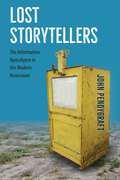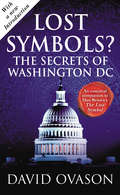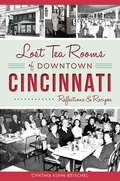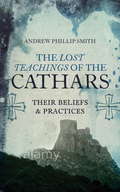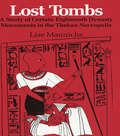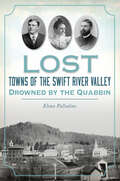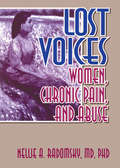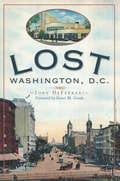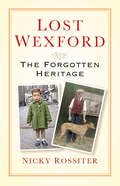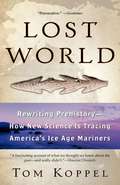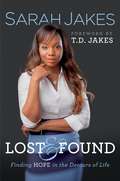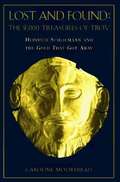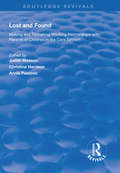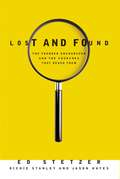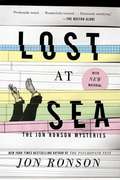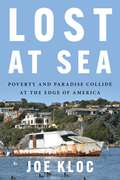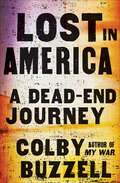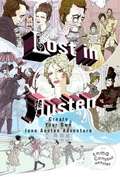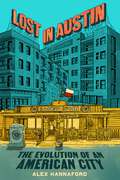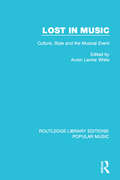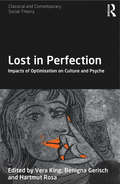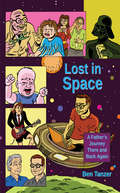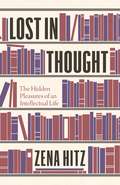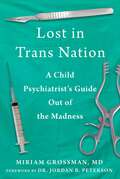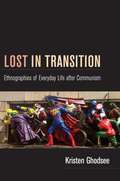- Table View
- List View
Lost Storytellers: The Information Apocalypse in the Modern Newsroom
by John PendygraftCommunity journalism in the era of clickbait An incisive and firsthand look at the landscape of community news today, Lost Storytellers argues that the decline of local journalism threatens the future of democracy. Award-winning photojournalist John Pendygraft asks: How did Americans lose trust in the media, and how can their local newsrooms earn it back? Pendygraft uses his own experiences at Florida’s largest newspaper, the Tampa Bay Times, to illustrate why trusted local reporting matters more than ever in the era of “fake news,” clickbait, conspiracy theories, and social media. Through interviews with his colleagues, the history of his own paper, journeys into the evolutionary psychology of storytelling, and examples of the ways multinational media conglomerates hook readers on news cycles of chaos and crisis, Pendygraft argues that community journalists can reclaim their roles as local storytellers—and that the public good demands that they try. Lost Storytellers offers insights for all who feel confused about the media, politics, and the well-being of their communities in the information age.
Lost Symbols?: The Secrets of Washington DC
by David OvasonThe secrets, the myths and the facts behind Washington, D.C.'s design and its Masonic significance.In this groundbreaking, original work, David Ovason reveals the intimate connections between the mysterious zodiacal symbols and the stellar lore of Washington, D.C. and the secret plan for the city.There are over fifty complete zodiacs in Washington, D.C., all witness to an extraordinary stellar mystery. Why did generations of architects and artists put their lives and energies on the line, when designing this City of the Stars? What was their shared secret language? What or who drove them to create a city overflowing with such esoteric symbolism? What is the meaning behind the secret symbolism of Washington, D.C.'s layout? And what does it mean for America's future?
Lost Tea Rooms of Downtown Cincinnati: Reflections & Recipes (American Palate)
by Cynthia Kuhn BeischelIt was a different time. Ladies wore gloves, hats and nice attire to luncheons at the Woman's Exchange. Shillito's provided a cosmopolitan environment for its patrons, while Mullane's was the perfect place to sip and socialize. The popular Good Morning Show radio program hosted by charming Bob Braun, and later Nick Clooney, was broadcast from McAlpin's Tea Room. Women gathered at Pogue's and Mabley & Carew tea rooms to celebrate birthdays, as well as wedding and baby showers, over dainty tea sandwiches. Author Cynthia Kuhn Beischel brings the Queen City's bygone downtown tea rooms back to life and shares more than one hundred beloved recipes.
Lost Teachings of the Cathars
by Andrew Phillip SmithCenturies after the brutal slaughter of the Cathars by papally endorsed Northern French forces,and their suppression by the Inquisiton the medieval Cathars continue to exert a powerful influence on both popular culture and spiritual seekers. Yet few people know anything of the beliefs of the Cathars beyond vague notions that they believed in reincarnation, were vegetarians, were somehow Gnostic, and had some relation to Mary Magdalene. The Lost Teachings of the Cathars explores the history of this Christian dualist movement between the 12th and 14th centuries, offering a sympathetic yet critical examination of its beliefs and practices. As well as investigating the origin of the Cathars, their relationship to the ancient Gnostics of the early centuries AD and the possibility that they survived the Inquisition in some way, the author also addresses recent renewed interest in Catharism. Eccentric esotericists initiated a neo-Cathar revival in the Languedoc which inspired the philosopher Simone Weil. The German Otto Rahn, who has been called the real-life Indiana Jones, believed that the Cathars were protectors of the Holy Grail and received support from Heinrich Himmler. Arthur Guirdham, a psychiatrist from the West of England, became convinced that he and a circle of patients had all been Cathars in previous lives. Tourists flock to the Languedoc to visit Cathar country. Bestsellers such as Kate Mosse's timeslip novel Labyrinth continue to fascinate readers. But what did the Cathars really believe and practice? From the Trade Paperback edition.
Lost Tombs
by MannicheFirst published in 1988. The Theban private tombs form a major source for our knowledge of Egyptian society. Ostensibly a great amount of work has been done in the necropolis over the past one hundred and sixty years of its modern history, and the bibliography for this area is among the most extensive in Egyptology. Many of the 415 or so decorated tombs have received a full publication, but for a great number only selected scenes have been made available, and a surprising amount remains to all intents and purposes unpublished. The present study is concerned with a number of painted tombs of the Eighteenth dynasty which were visited by the early travellers, but the exact location of which is now unknown. The careful drawings and tracings made by these pioneers are apparently all that remains to show the appearance of these tombs. Some of the scenes represented are not found elsewhere in the necropolis, and others have special points of interest or unique details, linguistic, iconographic and religious, to offer. This very important material has not previously been used by scholars, and it has not been recognized that fragments of some of these vanished tombs can actually be traced to collections in museums and elsewhere.
Lost Towns of the Swift River Valley: Drowned by the Quabbin (Lost)
by Elena PalladinoIn April 1938, Swift River Valley residents held a farewell ball to mark the demise of the quintessential New England town of Enfield and its three smaller neighbors, Greenwich, Dana, and Prescott. The Commonwealth of Massachusetts sacrificed these three towns to build the Quabbin, a massive reservoir of drinking water for residents of Boston. Three prominent residents attended the somber occasion. Marion Andrews Smith was the last surviving member of an important manufacturing family. Willard "Doc" Segur was the valley's beloved country doctor and town leader. And Edwin Henry Howe was Enfield's postmaster and general store proprietor. They helped build their beloved community for decades, only to watch grief-stricken as it was destroyed by 400 billion gallons of water. Author and historian Elena Palladino recounts the story of these communities as seen through eyes of those who lived there until the end.
Lost Voices: Women, Chronic Pain, and Abuse
by Nellie A RadomskyIn this illuminating book, Dr. Nellie Radomsky explores the complexity of chronic pain in women and evidence for its association with abuse--an issue largely unrecognized by medical practitioners. Modern medical training emphasizes diagnosis and cure, but chronic pain problems often have no identifiable organic cause, and the women who suffer are often not listened to in the doctor’s office. Lost Voices: Women, Chronic Pain, and Abuse addresses how women, by gaining knowledge of the ways the medical culture--and the larger culture--have silenced them, may move into a healing process and learn to speak out. The author encourages women in pain to give voice to their buried experiences and shows them that speaking out about their experiences with abuse and chronic pain can be the first step on the road to healing. The author explores the lost voices of women in pain through stories based on her personal encounters with patients in her practice. These women and their case histories help illustrate the interactions of chronic pain and abuse and the complexity of the doctor-patient relationship. Among the many areas Dr. Radomsky examines are:how the medical culture has silenced women chronic pain in women with a history of abuse the relationship of women’s healing processes and the sense of finding and expressing “lost voices” the doctor-patient relationship and obstacles to healing the limitation of medical models with respect to understanding complex chronic pain issues how acute and chronic pain differ and how physicians and patients alike struggle with this understandingScientific but very readable, Lost Voices assists readers in the search for answers to complex pain problems. It is a hope-full resource for women struggling with chronic pain and personal abuse issues and an enlightening guide for physicians, therapists, and others working with these women. Professionals working in the area of chronic pain, readers involved in feminist issues, and academic physicians interested in medicine as culture will find Lost Voices a revealing book.
Lost Washington, D. C. (Lost Ser.)
by John DeFerrariThe author of the popular blog &“The Streets of Washington&” shares new vignettes and reader favorites exploring the colorful history of America&’s capitol. In Lost Washington, D.C., John DeFerrari investigates the bygone institutions and local haunts of the nineteenth and twentieth centuries. Washington may seem eternal and unchanging with its grand avenues and stately monuments, but longtime locals and earlier generations knew a very different place. Discover the Washington of lavish window displays at Woodies, supper at the grand Raleigh Hotel and a Friday night game at Griffith Stadium. From the raucous age of burlesque at the Gayety Theater and the once bustling Center Market to the mystery of Suter's Tavern and the disappearance of the Key mansion in Georgetown, DeFerrari recalls the lost city of yesteryear.
Lost Wexford: The Forgotten Heritage
by Nicky RossiterOver the years trades, streets, buildings, shops and a myriad of other items have gone from Wexford’s landscape. However, this book recalls not only these physical losses but also includes the many items of culture, local lore and other ephemeral heritage that disappears by the week. With chapters on industry, religious practices, entertainment and Wexford characters, this fascinating compendium this can be dipped into time and time again to reveal something new about the people, the heritage and the secrets of this maritime town.
Lost World
by Tom KoppelFor decades the issue seemed moot. The first settlers, we were told, were big-game hunters who arrived from Asia at the end of the Ice Age some 12,000 years ago, crossing a land bridge at the Bering Strait and migrating south through an ice-free passage between two great glaciers blanketing the continent. But after years of sifting through data from diverse and surprising sources, the maverick scientists whose stories Lost World follows have found evidence to overthrow the "big-game hunter" scenario and reach a new and startling and controversial conclusion: The first people to arrive in North America did not come overland -- they came along the coast by water. In this groundbreaking book, award-winning journalist Tom Koppel details these provocative discoveries as he accompanies the archaeologists, geologists, biologists, and paleontologists on their intensive search. Lost World takes readers under the sea, into caves, and out to the remote offshore islands of Alaska, British Columbia, and California to present detailed and growing evidence for ancient coastal migration. By accompanying the key scientists on their intensive investigations, Koppel brings to life the quest for that Holy Grail of New World prehistory: the first peopling of the Americas.
Lost and Found: Finding Hope in the Detours of Life
by T. D. Jakes Sarah JakesDon't let your past keep you from a full future. Like every girl, Sarah Jakes dreamed of a life full of love, laughter, and happy endings. But her dreams changed dramatically when she became pregnant at age thirteen, a reality only compounded by the fact that her father, Bishop T. D. Jakes, was one of the most influential megachurch pastors in the nation. As a teen mom and a high-profile preacher's kid, her road was lonely. She was shunned at school, gossiped about at church. And a few years later, when a fairy-tale marriage ended in a spiral of hurt and rejection, she could have let her pain dictate her future. Instead, she found herself surrounded by a God she'd given up on, crashing headlong with Him into a destiny she'd never dreamed of. Sarah's captivating story, unflinchingly honest and deeply vulnerable, is a vivid reminder that God can turn even the deepest pain into His perfection. More than a memoir, "Lost and Found" offers hope and encouragement. Perhaps you, like Sarah, find yourself wandering the detours of life. Regardless of how lost you feel, you, too, can be found.
Lost and Found: Heinrich Schliemann and the Gold That Got Away
by Caroline MooreheadIn this book, journalist and biographer Caroline Moore Head explores Schliemann's extraordinary life and tells how he contrived to smuggle part of the treasure from his dig in Asia Minor to his government in Berlin.
Lost and Found: Making and Remaking Working Partnerships with Parents of Children in the Care System (Routledge Revivals)
by Judith Masson Christine Harrison Annie PavlovicFirst published in 1999, this volume is a collection of essays focused on the theme of partnership with parents in social work practice with children and families. It covers issues relating to the quality of care and preparation for aftercare, particularly children’s identity needs and preparation for life after care which are highlighted in the Quality Protects programme. It developed from an action research project, funded by the Joseph Rowntree Foundation and conducted by the editors a Warwick University between 1993 and 1996. Through teaching activities associated with the implementation of the Children Act 1989 the editors became aware that there were many parents who had lost contact with both their child and their child’s social workers after their child had entered the care system. These were the ‘lost’ parents of the study. Partnership with parents has become an integral part of social work with children and families living together or apart. Inevitably it concerns many other people involved in the care of children and providing advice to individuals. Partnership permeates all aspects of relationships between parents, children and those providing care in place of parents. Consequently, the issues discussed in this book are of relevance to all those working directly or indirectly with children, parents and other relatives. Amongst these are social workers, family placement workers, carers and residential workers, team managers and policy makers in local authority social services departments, guardians ad litem, court welfare officers and lawyers acting for children or parents, children’s rights officers and advisers working in voluntary agencies which support families and children.
Lost and Found: The Younger Unchurched and the Churches That Reach Them
by Ed Stetzer Richie Stanley Jason HayesLost and Found presents comprehensive research about, and in-depth interviews with, over one thousand young adults in their twenties, mostly in regard to how open their generation is to spiritual things. The findings will surprise many readers and break some long established assumptions. Expert church and culture author Ed Stetzer (Breaking the Missional Code) joins with twenty-year church research veteran Richie Stanley and young adult ministry specialist Jason Hayes to examine the younger unchurched and hundreds of congregations that are effectively reaching them. Any church that is concerned about outreach to this generation will discover principles and ideas to learn from and adapt into their own ministry.
Lost at Sea
by Jon RonsonThe New York Times–bestselling author of The Psychopath Test, Jon Ronson writes about the dark, uncanny sides of humanity with clarity and humor. Lost at Sea reveals how deep our collective craziness lies, even in the most mundane circumstances. Ronson investigates the strange things we’re willing to believe in, from lifelike robots programmed with our loved ones’ personalities to indigo children to hypersuccessful spiritual healers to the Insane Clown Posse’s juggalo fans. He looks at ordinary lives that take on extraordinary perspectives, for instance a pop singer whose life’s greatest passion is the coming alien invasion, and the scientist designated to greet those aliens when they arrive. Ronson throws himself into the stories—in a tour de force piece, he splits himself into multiple Ronsons (Happy, Paul, and Titch, among others) to get to the bottom of credit card companies’ predatory tactics and the murky, fabulously wealthy companies behind those tactics. Amateur nuclear physicists, assisted-suicide practitioners, the town of North Pole, Alaska’s Christmas-induced high school mass-murder plot: Ronson explores all these tales with a sense of higher purpose and universality, and suddenly, mid-read, they are stories not about the fringe of society or about people far removed from our own experience, but about all of us. Incisive and hilarious, poignant and maddening, revealing and disturbing—Ronson writes about our modern world, the foibles of contemporary culture, and the chaos that lies at the edge of our daily lives. .
Lost at Sea: Poverty and Paradise Collide at the Edge of America
by Joe KlocA deeply personal nine-year account of the lives of the “anchor-outs”—an unhoused community living off the California coast on abandoned boats—that explores the struggles and resilience of those surviving on the fringes of society.In the wake of the financial crisis, the number of anchor-outs living in Richardson Bay more than doubles as their long-simmering feud with the wealthy residents of Marin County—one of the richest counties in the country—finally boils over. Many of the shoreline’s well-heeled yacht club members and mansion owners blame their unhoused neighbors for rising crime on the waterfront. Meanwhile, local politicians accuse them of destroying the Bay Area’s marine ecosystem and demand their eviction. When the pandemic breaks out, a slew of city and regional authorities heed the call: they seize and crush the anchor-outs’ boats, arresting dissenters as they dismantle one of the nation’s oldest unhoused communities.Kloc’s near-decade-long firsthand account of the joys, hardships, and eventual demise of the anchor-outs is in many ways the story of being poor in America. Examining the profit-driven policies that exacerbate the contemporary housing crisis, Lost at Sea weaves together tales of comradery and survival on the anchorage with the rich history of the region, from the creation of unspeakable wealth during the San Francisco Gold Rush era to the aftermath of the devastating earthquake and fire of 1906, when the first unhoused people dropped their anchors in Marin County.Along the way, Kloc discovers the quiet beauty of the world the anchor-outs built: how they’ve learned to care for each other, band together to fend off real estate developers and NIMBY neighbors, and fight for a way of life that is entirely unrecognizable to those on shore. Lost at Sea explores the often overlooked world of poverty and homelessness that exists in even the wealthiest enclaves of America, where people who have fallen on hard times struggle to rebuild their lives among those who would rather just wish them away.
Lost in America: A Dead-End Journey
by Colby Buzzell"Nothingless than the soul of an extremely interesting human being at war on ourbehalf." —Kurt VonnegutAstunning portrait of modern America by Colby Buzzell,the critically acclaimed author of My War: Killing Time in Iraq.Recounting his five-month journey through the country, from its thrivingcoastlines to its rust-belt wrecks, Buzzell reveals aparadoxical landscape of American dreams both achieved and broken, manifestdestinies claimed and refuted, and community ties pulled apart and patchedtogether. In the tradition of John Steinbeck’s Travels with Charley, Buzzell’s Lost in America uncovers the starkrealities of our national character even as it explores the deepest questionsof identity, unity, and fatherhood.
Lost in Austen: Create Your Own Jane Austen Adventure
by Emma Campbell WebsterBringing together Jane Austen's most beloved characters and storylines-a clever, playful, interactive, and highly entertaining approach to the wildly popular novels in which you, the reader, decide the outcome. Name: Elizabeth Bennet. Mission: To marry both prudently and for love. How? It's entirely up to the reader. The journey begins in Pride and Prejudice but quickly takes off on a whimsical Austen adventure of the reader's own creation. A series of choices leads the reader into the plots and romances of Austen's other works. Choosing to walk home from Netherfield Hall means falling into Sense and Sensibility and the infatuating spell of Mr. Willoughby. Accepting an invitation to Bath leads to Northanger Abbey and the beguiling Henry Tilney. And just where will Emma's Mr. Knightley fit in to the quest for a worthy husband? It's all up to the reader. A labyrinth of love and lies, scandals and scoundrels, misfortunes and marriages, Lost in Austen will delight and challenge any Austen lover.
Lost in Austin: The Evolution of an American City
by Alex HannafordA long-time Austinite and journalist’s exploration of the profound movements that have shaped Austin, Texas—charting the shifts within its vibrant music scene, the impact of rapid urbanization, and the challenges of gentrification—ultimately questioning what this city’s transformation signals for American urban identity.Austin isn’t what it used to be.This is a common sentiment amongst locals, offered with the same confused—and often disappointed—tone familiar to residents of Seattle, Portland, or San Francisco, where rapid growth and expansion have led to an urban identity crisis. Like those cities, Austin is known for its unique qualities: a thriving live music scene and housing affordability that historically made it a compelling home for creatives and self-described weirdos to roost. But now, as Big Tech infiltrates and climate change looms, Austin has become less familiar—and far less affordable.An exploration of the beloved city’s evolution, Lost in Austin also serves as a critical exploration of the transformation that has befallen one of America’s most beloved cities—and serves as a warning for what the homogenization of cities means for American urban identity. With a journalist’s perspective and the heart of an Austinite, Alex Hannaford delves into the consequences of the city’s rapid growth in chapters that chronicle the major movements permanently altering the city: a vanishing music scene, soaring property values, and the encroachment of major industry. Through keen reportage and extensive interviews, Lost in Austin unveils the toll of unchecked growth and the city’s shift from its rebellious spirit to commercialization.Through those stories—vibrant, colorful, and clearly full of love for this city—Hannaford raises a crucial question: How do American cities, once celebrated for their unique values, became casualties of their own rapid growth and success? And can they ever return to what they once were?
Lost in Music: Culture, Style and the Musical Event (Routledge Library Editions: Popular Music #5)
by Avron Levine WhiteThis collection of essays, first published in 1987, provides a sociological treatment of many musical forms – rock, jazz, classical – with special emphasis on the perspective of the practising musician. Among the topics covered are the legal structures governing musical production and the question of copyright; recording and production technology; the social character of musical style; and the impact of lyrical content, considered socially and historically.
Lost in Perfection: Impacts of Optimisation on Culture and Psyche (Classical and Contemporary Social Theory)
by Hartmut Rosa Vera King Benigna GerischThe permanent struggle for optimisation can be seen as one of the most significant cultural principles of contemporary Western societies: the demand for improved performance and efficiency as well as the pursuit of self-improvement are con-sidered necessary in order to keep pace with an accelerated, competitive modern-ity. This affects not only work and education, but also family life, parent–child relationships and intimate relationships in respect to the body and the self, in regard to the public as well as the private realm. Bringing together contributions from renowned scholars from the fields of sociology, psychology and psycho-analysis, this book explores the impacts of optimisation on culture and psyche, examining the contradictions and limitations of optimisation, in conjunction with the effects of social transformations on individuals and shifts in regard to the meaning of ‘pathology’ and ‘normality’.
Lost in Space
by Steven Lafler Ben TanzerLost in Space is a sometimes funny, sometimes sad, but always lively essay collection about fathers and sons, and their relationship to not only one another, but pop culture, death, and sex-because sex sells, even if you're otherwise focused on parenting and the generation spanning cultural impact of Star Wars.The essays in Lost in Space are focused on an array of child-rearing topics including sleep, discipline, first haircuts, deceased parents/grandparents and illness, and the inherent challenges and humor that coincide with, and are intrinsically tied-into, these stages of life. The essays also recognize the ongoing presence of the author's dead father in his life even as he seeks to parent without his father's guidance or advice.
Lost in Thought: The Hidden Pleasures of an Intellectual Life
by Zena HitzAn invitation to readers from every walk of life to rediscover the impractical splendors of a life of learningIn an overloaded, superficial, technological world, in which almost everything and everybody is judged by its usefulness, where can we turn for escape, lasting pleasure, contemplation, or connection to others? While many forms of leisure meet these needs, Zena Hitz writes, few experiences are so fulfilling as the inner life, whether that of a bookworm, an amateur astronomer, a birdwatcher, or someone who takes a deep interest in one of countless other subjects. Drawing on inspiring examples, from Socrates and Augustine to Malcolm X and Elena Ferrante, and from films to Hitz's own experiences as someone who walked away from elite university life in search of greater fulfillment, Lost in Thought is a passionate and timely reminder that a rich life is a life rich in thought.Today, when even the humanities are often defended only for their economic or political usefulness, Hitz says our intellectual lives are valuable not despite but because of their practical uselessness. And while anyone can have an intellectual life, she encourages academics in particular to get back in touch with the desire to learn for its own sake, and calls on universities to return to the person-to-person transmission of the habits of mind and heart that bring out the best in us.Reminding us of who we once were and who we might become, Lost in Thought is a moving account of why renewing our inner lives is fundamental to preserving our humanity.
Lost in Trans Nation: A Child Psychiatrist's Guide Out of the Madness
by Miriam GrossmanThroughout our country, atrocities are taking place in doctor&’s offices and hospital operating rooms. Physically healthy children and adolescents are being permanently disfigured and sometimes sterilized. Those youth say they&’re transgender, and we—their parents, teachers, therapists, and doctors—are supposed to agree with their self-diagnosis and take a back seat as they make the most consequential decision of their lives: to alter their bodies in order to, we are told, &“align&” them with their minds. Medical, educational, and government authorities advise us to support the &“gender journeys&” of still developing kids, including medical interventions with poor evidence of long-term improvement. This would not be acceptable in any other field of medicine. Indeed, the treatments our medical authorities and Washington call &“crucial&” and &“life-saving&” have been banned in progressive Sweden, Finland, and Britain. Dr. Miriam Grossman is a child and adolescent psychiatrist whose practice consists of trans-identified youth and their families. In Lost in Trans Nation, she implores parents to reject the advice of gender experts and politicians and trust their guts—their parental instincts—in the face of an onslaught of ideologically driven misinformation that steers them and their children toward risky decisions they may end up mourning for the rest of their lives. The beliefs that male and female are human inventions; that the sex of a newborn is arbitrarily &“assigned&”; and that as a result the child requires &“affirmation&” through medical interventions—these ideas are divorced from reality and therefore hazardous, especially to children. The core belief—that biology can and should be denied—is a repudiation of reality and a mockery of what hard science teaches about being male and female. Dr. Grossman believes that parents know their child best; they especially know if they have a son or daughter. But currently in our country when it comes to gender identity, everyone knows better than mom and dad. Schools enable students to live double lives—Patrick at home, Patti at school. Activists tell kids their loving homes are &“unsafe&” when parents voice doubts about the child&’s new identity. For refusing to see their son as their daughter, parents might be reported to protective services, a development that can lead to a family&’s destruction. Lost in Trans Nation arms parents with the ammunition to avoid, or, if necessary, fight what many families describe as the most difficult challenge of their lives. Parents will learn what to say and how—at home, at school, and if necessary, to police when they appear at the door. &“Don&’t be blindsided like so many parents I know,&” warns Grossman, &“be proactive and get educated. Feel prepared and confident to discuss trans, nonbinary, or whatever your child brings to the dinner table.&” Whether it&’s the &“trans is as common as red hair&” claim, or the &“I&’m not your son, I&’m your daughter&” proclamation, or the &“do you prefer a live son or a dead daughter&’ threat, says Grossman, no family is immune, and every parent must be prepared. No child is born in the wrong body, Dr. Grossman reassures us, their bodies are just fine; it&’s their emotional lives that need healing. Whether you&’re facing a gender identity battle in your home right now, or want to prevent one, you need this book to guide you and your loved ones out of the madness.
Lost in Transition: Ethnographies of Everyday Life After Communisim
by Kristen GhodseeLost in Transition tells of ordinary lives upended by the collapse of communism. Through ethnographic essays and short stories based on her experiences with Eastern Europe between 1989 and 2009, Kristen Ghodsee explains why it is that so many Eastern Europeans are nostalgic for the communist past. Ghodsee uses Bulgaria, the Eastern European nation where she has spent the most time, as a lens for exploring the broader transition from communism to democracy. She locates the growing nostalgia for the communist era in the disastrous, disorienting way that the transition was handled. The privatization process was contested and chaotic. A few well-connected foreigners and a new local class of oligarchs and criminals used the uncertainty of the transition process to take formerly state-owned assets for themselves. Ordinary people inevitably felt that they had been robbed. Many people lost their jobs just as the state social-support system disappeared. Lost in Transition portrays one of the most dramatic upheavals in modern history by describing the ways that it interrupted the rhythms of everyday lives, leaving confusion, frustration, and insecurity in its wake.
